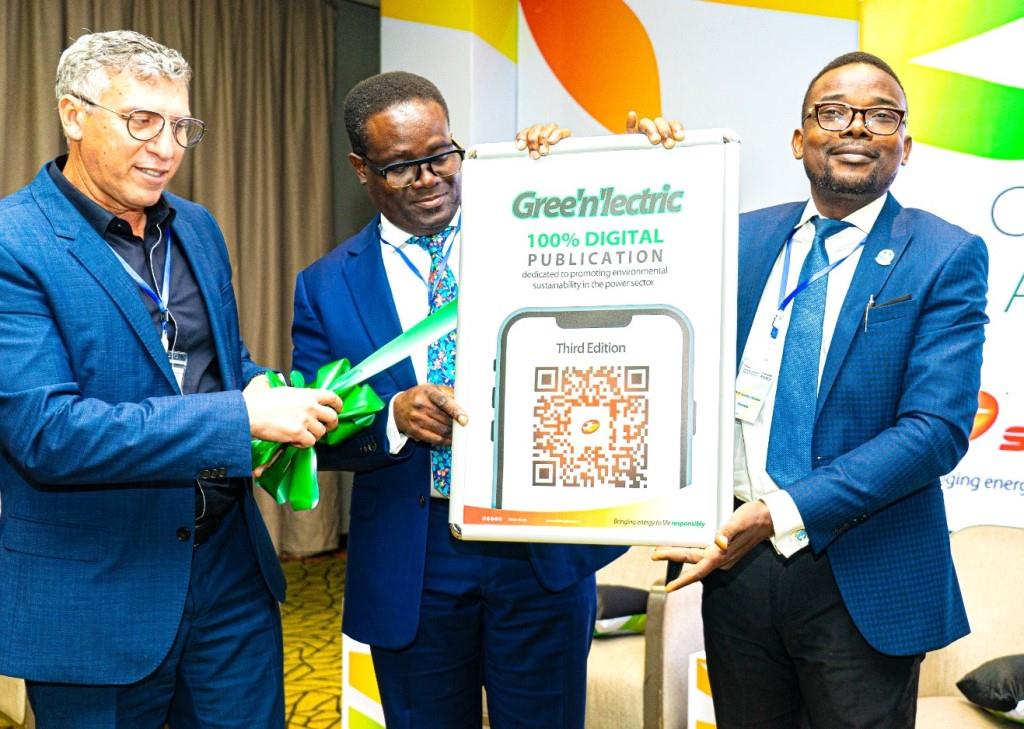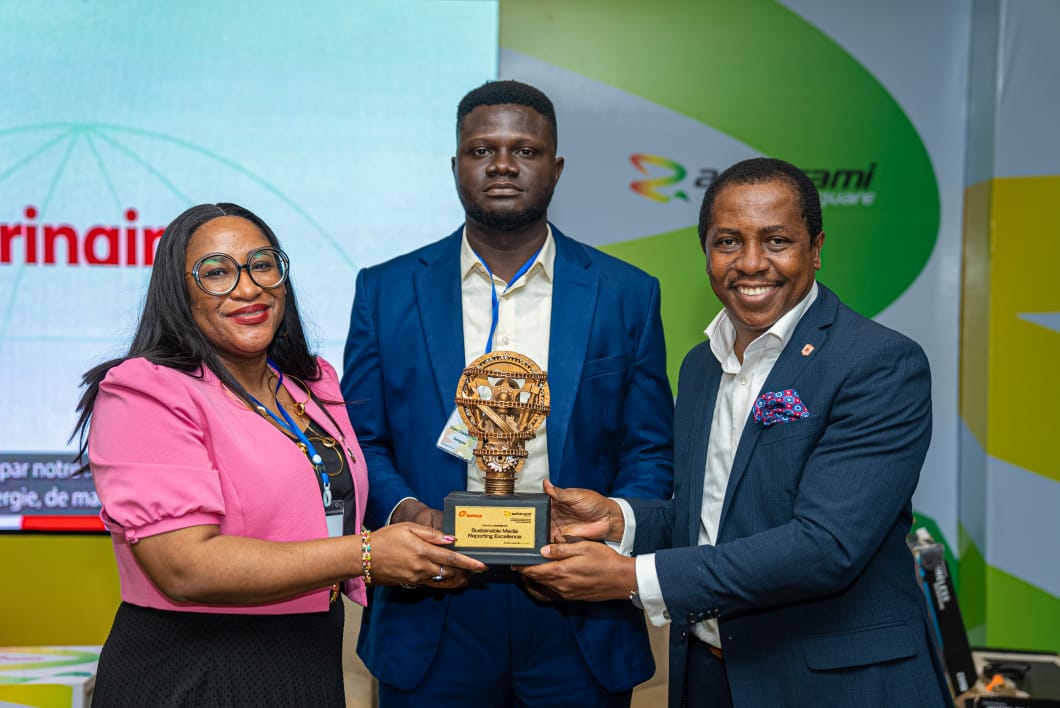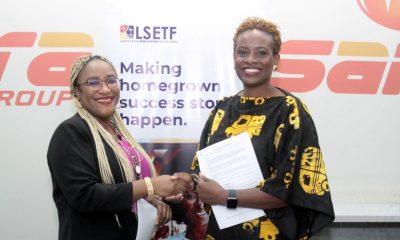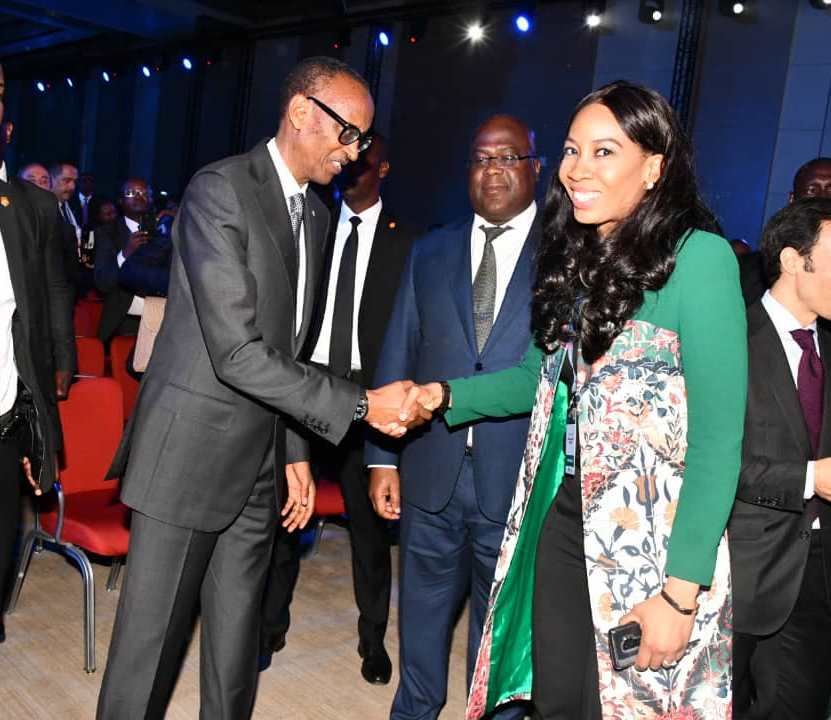Education
Sahara Group Reaffirms Commitment to Literacy, Skills Development
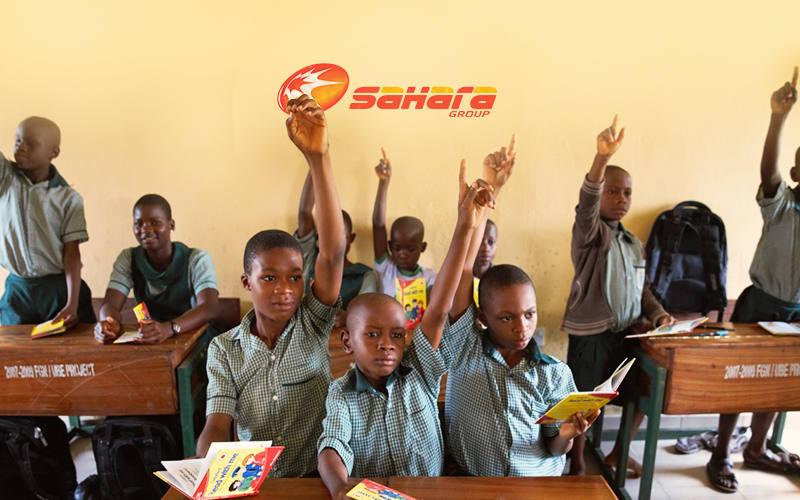
By Modupe Gbadeyanka
The ability to read and write is not only a fundamental human right but in the 21st century, it is an essential tool for human survival. Like Darwin propounded in his theory of evolution by Natural Selection, species that fail to acquire the abilities [skills] and features for survival or competitiveness in an ever-evolving world will die – commonly referred to as survival of the fittest. Survival of the fittest refers to the ability of a species to survive and reproduce its kind.
Literacy, at the very least, in its most basic form, the ability to read and write – is a critical evolutionary feature for any human in the 21st century. It is becoming unthinkable that any human can make any significant impact or progress in the times that we live without the most basic form of education.
The International Literacy Day is a day set aside every year to remind world leaders and policymakers of the importance of education/literacy to the development of a people and the growth of a nation.
Globally, it is estimated that at least 750 million adults, including 102 million young people (15-24 years old), lack basic literacy skills. Further estimates show that six out of ten children and adolescents (617 million) are not achieving minimum proficiency levels in reading and mathematics. These are alarming statistics for the survival prospects of these millions of people. If they are to make it to the next generation, they must acquire these literacy skills for survival.
Literacy is the basis for lifelong learning and plays a crucial foundational role in the creation of sustainable, prosperous and peaceful societies. In addition, it equips people with the abilities/skills to make a living and develop key resources for their growth and development.
According to Bethel Obioma, Head, Corporate Communications, Sahara Group, the leading energy, and infrastructure conglomerate has invested in and supported various projects and programmes aimed at improving youth and child literacy across Sahara’s locations in Asia, Europe, Africa, and the Middle East.
In 2014 and 2015, Sahara Foundation implemented a book drive aimed at improving the interest of children in reading. The intention was to build up an interest in the children to learn early the importance of life-long learning. Staff members also volunteered to read to children in those schools. “The sessions remain evergreen in the minds of the children, providing the foundation for a strong bond between Sahara and the beneficiaries. Helping people pursue and realize their dreams is a venture that Sahara is passionate about,” Obioma said.
In addition, undergraduates of the University of Lagos, through AIESEC Lagos were supported in their drive to equip other young students with the knowledge of the Sustainable Development Goals (SDGs) and how it relates to their development.
Sahara Foundation’s support for the Vocational Centre in Surulere represents a sustainable platform for propagating skills acquisition and development. At the centre, young people are equipped with vocational skills in catering, hairdressing, photography, and ICT among others. Sahara’s core support for the centre was for the upgrade of the industrial kitchen to a modern one for the beneficiaries to acquire skills that they need to become self-sufficient catering entrepreneurs. Through our support for this centre, over 1000 young caterers have benefitted with more than half of them becoming gainfully employed or business owners.
In a bid to develop the skills of young people at scale, Sahara Foundation launched the Saharahub digital platform to empower millions of young people from around the world with the needed skills for improved lives.
This year, Sahara Foundation in partnership with Realizing Education for Development (READ) International are empowering 30 young men and women in Dar es Salaam, Tanzania, with entrepreneurship skills and built their vocational capacities. The support to these beneficiaries includes startup capital, vocational training, business advisory and post-training support as well market access. In line with our Extrapreneurship framework, the goal is to ensure that the supported beneficiaries – all youths – are able to start and sustain successful businesses while empowering other young Tanzanians as their business grows.
Oluseyi Ojurongbe, Sahara Foundation said the energy giant would continue to seek avenues for promoting literacy and skills development.
“At Sahara, we believe that education essential to economic sufficiency. As such, we support education and execute literacy and education programmes. The subject of literacy (and skills development) is so important to us that from inception, Education and Capacity Building has been one of the four pillars of our Personal and Corporate Social Responsibility focus. We have and will continue to support the literacy and skills development of young people.”
Education
Hallos Launches Learning247 Summit

By Adedapo Adesanya
Live-learning and creator-economy platform, Hallos, as part of its expansion drive, has unveiled plans to equip millions of youths and women with digital skills and monetisation opportunities through the Learning247 Hallos Summit, aimed at integrating Nigeria’s South-East into the rapidly expanding global creator economy.
At a sensitisation and stakeholder engagement forum in Enugu, the organisation also called for stronger strategic partnerships with government agencies, educational institutions, development organisations, media houses and private-sector stakeholders to advance the creator economy as a credible engine for mass employment, youth prosperity and inclusive economic growth.
The chief executive of Hallos, Mr Alexander Oseji Uzoma, renewed the call for increased investment in internet penetration, reliable power supply, digital infrastructure, creative studios and youth-focused innovation hubs across Nigeria, especially the South-East.
Describing the creator economy as one of the most accessible and scalable employment frontiers globally, he noted that with basic tools such as a smartphone, internet access and creative skills, young people can build audiences, monetise knowledge and generate sustainable income without heavy capital investment or long career pathways.
According to Mr Uzoma, the creator economy offers low-barrier entry into diverse professions, including content creation, social media influencing, live tutoring and digital coaching, video production, podcasting, graphic design, music and performance arts, digital marketing, merchandise design, e-commerce and community management. These activities support a broader value chain spanning production, distribution, technology and management.
The Hallos co-founder also explained that global projections place the creator economy in the hundreds of billions of dollars, with millions of creators worldwide earning sustainable incomes, stressing that Hallos is focused on localising these opportunities to ensure African youths can participate meaningfully and compete globally.
He further noted that Hallos operates a live-learning and creator-focused platform that integrates education, gamified quizzes, merchandising and voluntary fan donations into a single ecosystem. Through the platform, creators can host live learning sessions and masterclasses, earn from quizzes and challenges, sell branded merchandise, receive voluntary donations, build communities around their expertise and organise monetisable podcasts.
Mr Uzoma said the creator economy, driven by social media platforms, streaming services, digital commerce and content monetisation tools, has evolved into a major global industry capable of generating wealth, creating jobs and expanding export earnings.
He stressed that social media should no longer be viewed as a recreational space but as a viable business environment for wealth creation.
“The focus should not just be on content creation alone but on building businesses around content. It is about value creation and structured digital entrepreneurship,” he said.
He disclosed that Hallos intends to reach about 10 million youths nationwide, with over 5,000 already engaged across its programmes, while placing strong emphasis on bridging the gender gap by empowering women and girls through targeted digital training, mentorship and access to monetisation platforms.
As the digital economy continues to expand, Hallos said the creator economy stands out as a practical and scalable solution to youth unemployment, offering low entry barriers and global earning potential.
The company reaffirmed its commitment to bridging the gap between talent and income, enabling young Africans to earn well above minimum wage through creativity, knowledge and structured participation in the global digital economy.
Education
Bayero University PG Students to Enjoy Dangote’s N1.5bn Scholarship

By Modupe Gbadeyanka
Post-graduate students of Bayero University Kano (BUK) will benefit from a scholarship worth about N1.5 billion from the Aliko Dangote Foundation (ADF).
The businessman put down the funds to support eligible MBA, entrepreneurship, and management postgraduate students of the institution under an initiative known as MHF Dangote Graduate Business Scholarship.
At a ceremony on Tuesday, the foundation and the school signed a Memorandum of Understanding (MoU) at the auditorium of the Dangote Business School, Kano.
The deal is to provide N300 million annually over five years as scholarship awards to the beneficiaries, who will receive N150,000 each per session, beginning with the 2024/25 academic session. This is equivalent to 50 per cent of the current N300,000 fee paid by the post-graduate students. There are 1,225 students in the Business School (696 fresh and 529 returning students).
One of the beneficiaries, Mr Khalid Bababubu, who is into manufacturing and specialises in MBA, Finance and Investment, thanked the organisation for the gesture.
“We are happy to be beneficiaries of this initiative. Education is the bedrock of national development, and we will not take this scholarship for granted,” he said.
A representative of ADF, Ms Mariya Aliko Dangote, said, “Our vision at the Foundation is to build human capital that translates into economic opportunity.
“Strengthening business and entrepreneurship education is critical to turning knowledge into enterprise, innovation, and jobs. This scholarship deepens our commitment to Dangote Business School by investing directly in the next generation of business leaders and change-makers.”
On his part, the Vice Chancellor of Bayero University Kano, Prof. Haruna Musa, said, “This support comes at a critical time for many families. Beyond financial relief, it strengthens the Business School’s role as a centre for developing entrepreneurial and management talent, particularly for women who are increasingly taking leadership roles in enterprise.”
It was explained that newly admitted students will receive automatic tuition reductions during registration, and returning students who have already paid in full will receive rebates. The N300 million allocation is structured to cover all eligible postgraduate students based on current enrolment capacity.
Any unutilised balance in the first year will be retained within the Dangote Business School development envelope to strengthen learning infrastructure and digital academic capacity, ensuring continued enhancement of the academic environment.
The MHF Dangote Graduate Business Scholarship is distinct from ADF’s recently announced nationwide STEM education interventions.
Education
Entries for InterswitchSPAK 8.0 Begin, Over N40m up for Grabs

By Aduragbemi Omiyale
Senior secondary school students across Nigeria have been invited to apply and demonstrate their academic excellence on a national stage in the eighth edition of the prestigious national science competition known as InterswitchSPAK.
The contest is organised by Interswitch, Africa’s leading technology company focused on creating solutions that enable individuals and communities prosper.
Registration for InterswitchSPAK 8.0 via www.interswitchspak.com has opened and will close on Friday, May 24, 2026. For the first time, in addition to group registrations through schools, parents can also register their individual children for the competition.
This year’s edition features a scholarship pool exceeding N40 million, with Interswitch expanding the prize structure to ensure broader impact.
The overall winner will receive a N15 million tertiary scholarship, including monthly stipends. The first runner-up will be awarded a N10 million scholarship, including monthly stipends; while the second runner-up will receive a N5 million scholarship, also including monthly stipends. All scholarships are payable over 5 years. Also, the top 9 finalists will all receive brand new laptops and other exciting prizes.
In addition to the top prizes, Season 8 introduces enhanced rewards for student finalists ranked 4th to 9th, as well as increased recognition for teachers supporting qualifying students from 1st to 9th place. This expanded structure reinforces Interswitch’s commitment to rewarding academic excellence and recognising the critical role educators play in shaping student success.
“At Interswitch, we strongly believe that Nigeria’s future will be shaped by how well we nurture today’s young minds. InterswitchSPAK goes beyond competition; it is a long-term commitment to empowering students and supporting teachers who are laying the foundation for innovation, problem-solving, and national development.
“As we launch Season 8, we remain focused on creating opportunity, rewarding merit, and inspiring excellence across Nigeria,” the Executive Vice President for Group Marketing and Communications at Interswitch, Ms Cherry Eromosele, said.
Designed to empower young minds in the Science, Technology, Engineering, and Mathematics (STEM) areas, InterswitchSPAK identifies, nurtures, and rewards students while equipping them with the skills and knowledge required to excel in STEM fields and drive innovation.
Over the past seven seasons, InterswitchSPAK has positively impacted thousands of students across the country, offering full university scholarships, mentorship opportunities, and national recognition for outstanding academic performance.
Beyond these rewards, the programme has consistently reinforced the importance of STEM education as a critical driver of innovation, problem-solving, and sustainable national development.
Through a transparent, technology-enabled selection process, InterswitchSPAK has also promoted educational equity by providing students from diverse socio-economic backgrounds with equal access to opportunity, ensuring that performance and merit remain central to success.
-

 Feature/OPED6 years ago
Feature/OPED6 years agoDavos was Different this year
-
Travel/Tourism10 years ago
Lagos Seals Western Lodge Hotel In Ikorodu
-

 Showbiz3 years ago
Showbiz3 years agoEstranged Lover Releases Videos of Empress Njamah Bathing
-

 Banking8 years ago
Banking8 years agoSort Codes of GTBank Branches in Nigeria
-

 Economy3 years ago
Economy3 years agoSubsidy Removal: CNG at N130 Per Litre Cheaper Than Petrol—IPMAN
-

 Banking3 years ago
Banking3 years agoSort Codes of UBA Branches in Nigeria
-

 Banking3 years ago
Banking3 years agoFirst Bank Announces Planned Downtime
-

 Sports3 years ago
Sports3 years agoHighest Paid Nigerian Footballer – How Much Do Nigerian Footballers Earn


